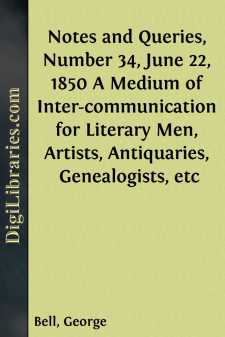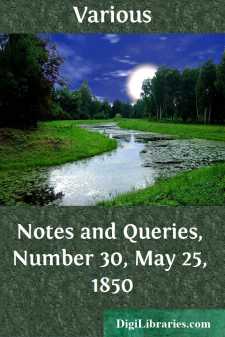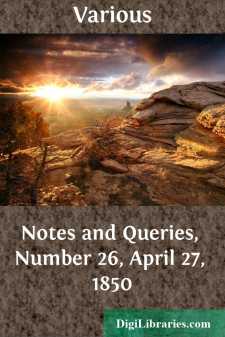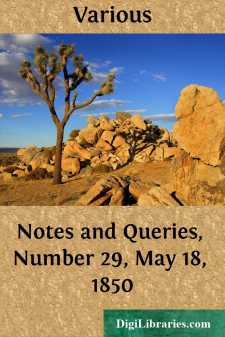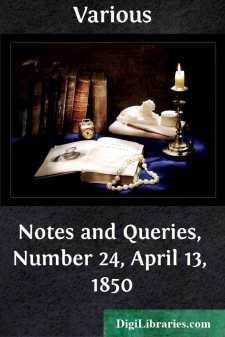Periodicals
- Art 27
- Children's periodicals 59
- Entertainment 5
- Food/Wine 2
- Games/Humor 455
- General
- Health 1
- History 53
- House/Home 1
- Regional 62
- Science/Nature 118
- Transportation 10
General Books
Sort by:
by:
George Bell
THE "AGAPEMONE" OF THE SIXTEENTH CENTURY. As it is not generally known that the "Agapemone" had a prototype in the celebrated Family of Love, some account of this "wicked sect" may not at this moment be without interest to your readers:— "Henry Nicholas, a Westphalian, born at Munster, but who had lived a great while at Amsterdam, and some time likewise at Embden, was the...
more...
by:
Various
DR. WHICHCOTE, MICHAEL AYNSWORTH, AND LORD SHAFTESBURY. Not less remarkable and interesting than the publication of Dr. Whichcote's Sermons by the noble author of the Characteristics, is a posthumous volume (though never designed for the press) under the following title:— "Several Letters written by a Noble Lord to a Young Man at the University. "Quo semel est imbuta recens servabit...
more...
by:
Various
NOTES DR. JOHNSON AND DR. WARTON. Amongst the poems of the Rev. Thos. Warton, vicar of Basingstoke, who is best remembered as the father of two celebrated sons, is one entitled The Universal Love of Pleasure, commencing— "All human race, from China to Peru, Pleasure, howe'er disguised by art, pursue." &c. &c. Warton died in 1745, and his Poems were published in 1748....
more...
by:
Various
OUR SECOND VOLUME. We cannot resist the opportunity which the commencement of our Second Volume affords us, of addressing a few words of acknowledgment to our friends, both contributors and readers. In the short space of seven months, we have been enabled by their support to win for "NOTES AND QUERIES" no unimportant position among the literary journals of this country. We came forward for the...
more...
by:
Various
NOTES. PRESENCE OF STRANGERS IN THE HOUSE OF COMMONS. In the late debate on Mr. Grantley Berkeley's motion for a fixed duty on corn, Sir Benjamin Hall is reported to have imagined the presence of a stranger to witness the debate, and to have said that he was imagining what every one knew the rules of the House rendered an impossibility. It is strange that so intelligent a member of the House of...
more...
by:
Various
NOTES NICHOLAS BRETON. Like Mr. COLLIER (No. 23. p. 364.), I have for many years felt "a peculiar interest about Nicholas Breton," and an anxious desire to learn something more of him, not only from being a sincere lover of many of his beautiful lyrical and pastoral poems, as exhibited in England's Helicon, Davison's Poetical Rhapsodie, and other numerous works of his own, and from...
more...
by:
Various
NOTES. ROGER BACON: HINTS AND QUERIES FOR A NEW EDITION OF HIS WORKS. Victor Cousin, who has been for many years engaged in researches on the scholastic philosophy, with the view of collecting and publishing such of its monuments as have escaped the diligence of scholars, or the ravages of time, has lately made the discovery in the library at Douay of a copy of an inedited MS. of Roger Bacon, entitled...
more...
by:
Various
OLIVER CROMWELL AS A FEOFFEE OF PARSON'S CHARITY, ELY There is in Ely, where Cromwell for some years resided, an extensive charity known as Parson's Charity, of which he was a feoffee or governor. The following paper, which was submitted to Mr. Carlyle for the second or third edition of his work, contains all the references to the great Protector which are to be found in the papers now in the...
more...
by:
Various
SKINNER'S LIFE OF MONK. Reading for a different purpose in the domestic papers of Charles II.'s reign in the State Paper Office, I came upon a letter from Thomas Skinner, dated Colchester, Jan. 30. 1677, of which I will give you what I have preserved in my notes; and that is all that is of any interest. It is a letter to the Secretary of State, asking for employment, and recommending himself...
more...
by:
Various
NOTES ETYMOLOGY OF PENNIEL. Some eighteen years ago, the writer of the following sonnets, by the kindness of the proprietors of a pleasant house upon the banks of the Teviot, enjoyed two happy autumns there. The Roman road which runs between the remains of the camp at Chew Green, in Northumberland, and the Eildon Hills (the Trimontium of General Roy), passed hard by. The road is yet distinctly visible...
more...


